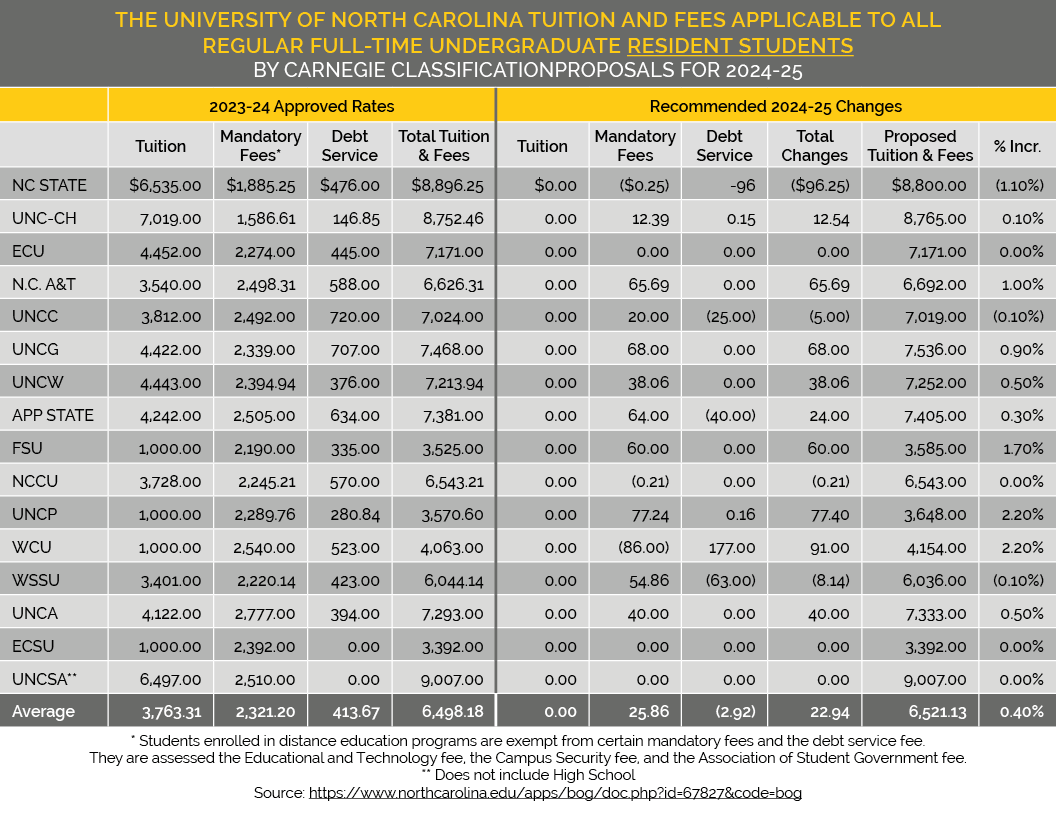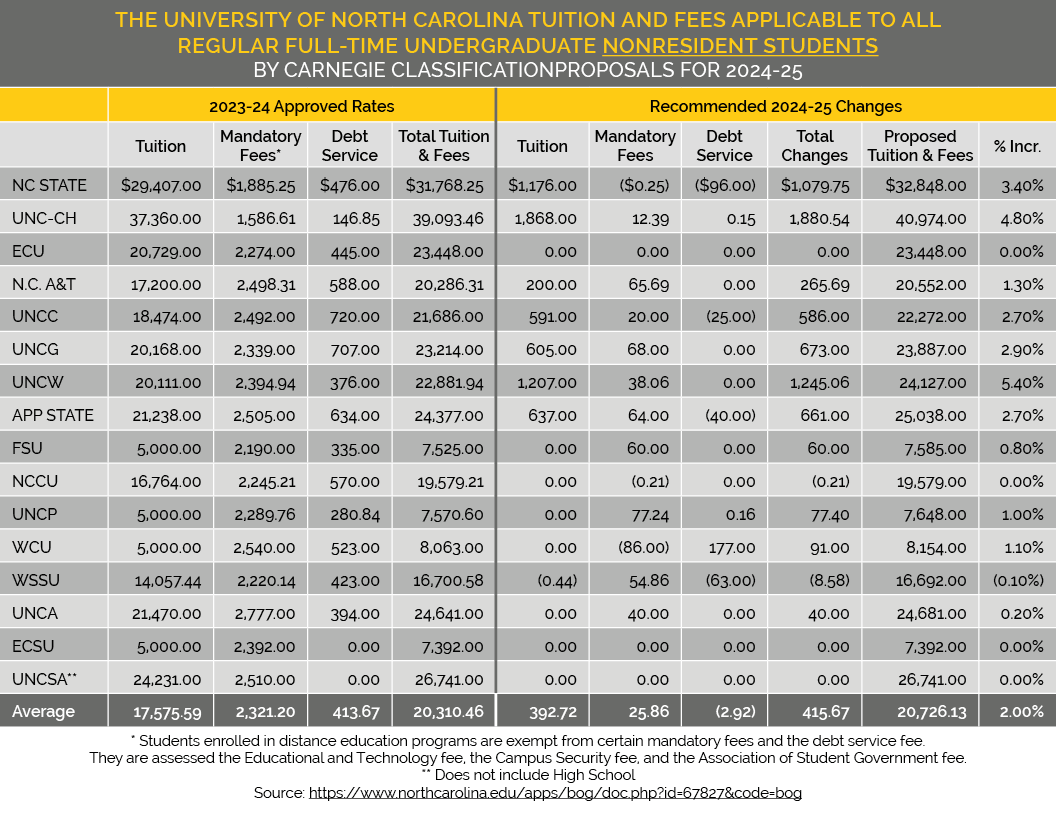Eight years of flat UNC tuition
Published February 29, 2024
One thing that’s not increasing in price these days is tuition for North Carolina college students.
For the eighth year in a row, the UNC Board of Governors voted today not to increase tuition for in-state undergraduate students for 2024-25. And fees for in-state students will increase by less than 1% systemwide, in part because of the cost to retain professionals for student health services.
Most campuses across the system will increase tuition for out-of-state students by 1% to 5%, however, for an average increase of 2%.
With worries about faculty and staff retention growing amid an inflationary period, though, some members of the governing board are beginning to question how long UNC schools can maintain flat tuition.
In a committee meeting Wednesday, board member John Fraley asked whether it’s healthy for all UNC institutions to rank last or next-to-last in tuition compared with their peer institutions – and his concerns were echoed by Board Chair Randy Ramsey.
In a separate committee meeting, System CFO Jennifer Haygood said that if the UNC System had increased tuition by 2% a year over the last seven years, the System would have an additional $57 million in funds.
WITH A LOADED AGENDA, the System’s governing board and its committees took up a variety of weighty topics this week:
- Legislative Agenda: The System’s priorities for the General Assembly’s “short” session that begins in April includes $46.5 million for increased enrollment and performance funds. All campuses would not be treated equally, though.
Winston-Salem State University would see the biggest percentage cut of $3.3 million due to the loss of enrollment for two years and poor performance metrics. East Carolina University would see a $4.3 million reduction. NC State would see a $13.8 million increase, and UNC Chapel Hill would see an additional $10.3 million. UNC Charlotte would see an increase of $9.6 million.
Board member Joel Ford said there should be “mitigating support” in the state budget for WSSU, as there was this year for UNC Greensboro and UNC Asheville, which also saw enrollment decline in recent years.
The System will also seek $8.5 million for completion grants to students at risk of dropping out due to financial troubles. The grants would go to students at Elizabeth City State, Fayetteville State, N.C. A&T, NC Central, UNC Asheville, UNC Greensboro, UNC Pembroke and Winston-Salem State.
The System also will request $48 million for increases in construction costs and $21.6 million for critical utility and infrastructure repairs at the state’s Historically Black Colleges and Universities.1
As a parent of a student at an HBCU, “It is embarrassing that our schools are running out of water and heat,” said Ford. He added that some HBCUs had to move students off campus this academic year just to have hot showers and heat.
“We need to prioritize this and fix these campuses,” Ford said. “…It’s quite frankly unacceptable.”
- Athletic Conference Switches: In another move to centralize control in the System Office after recent additions to the Atlantic Coast Conference, the board voted with no discussion today togive itself control over schools switching athletic conferences.
Under the new policy, university chancellors must submit notice of changes in conference affiliation and a financial plan to the System President and possibly the Board of Governors for approval.2
- Foundations of Democracy: After working with system faculty, a board committee voted for a new requirement that UNC schools incorporate instruction in the Declaration of Independence, the U.S. Constitution (including the Bill of Rights), the Federalist Papers, the Gettysburg Address, the Emancipation Proclamation and Rev. Martin Luther King Jr.’s “Letter from Birmingham Jail.”3
Senior Vice President for Academic Affairs David English said the move – which will be considered by the full board in April – will be developed by the campuses and is consistent with a requirement from the General Assembly to build “civic literacy” in high schools. The policy will go to the full board in April.
- SAT/ACT Admission Requirement: In response to the Covid pandemic, the Board of Governors waived requirements for applicants to take the SAT and ACT standardized tests in July 2020.
The Board’s Education Planning Committee had a spirited discussion about a proposal to again require standardized test scores, starting with students entering in Fall 2025. For students entering in Fall 2026, applicants with a grade-point average (GPA) of 2.5 to 2.8 would have to submit a score of 17 or higher on the ACT or 930 or higher on the SAT.4
Andrew Kelly, the System’s senior vice president for strategy and policy, said that while a student’s GPA is a strong indicator of student success, admissions officers see evidence of grade inflation.
“ACT scores are correlated with student success,” Kelly said.
Board member Art Pope recommended that all campuses should receive standardized test data, but each campus should be given flexibility to decide how to use it.
“There is a seat for every student to be matched with a campus,” Pope said.
Board member Gene Davis said many UNC peer institutions do not require standardized tests, so the requirement for test scores would place UNC campuses at a competitive disadvantage in recruiting students – particularly during a period of flat or declining enrollment.
“We want them to go to one of our schools, and we want them to stay here, work here, live here and raise their families here,” Davis said.
He challenged the notion of excluding students due to low test scores.
“That’s not who we are as a state,” Davis said. “We need to double down … to help them achieve the American dream.”
Board member Wendy Murphy said the emphasis on test scores underscores the need to teach students to read at an early age.
- ROI Studies and Academic Program Reviews: If it isn’t already clear that this Board of Governors is all about educating for a job, a proposed policy makes it clear that academic program reviews – like one just completed at UNC Greensboro and one about to begin at UNC Asheville – will occur across the UNC System and be based in part on job demands and the earnings of graduates.
Kirk Bradley, Chair of the Board’s Education Planning Committee, said the Board committed to the General Assembly that it would consider return on investment – largely graduate earnings – in future academic planning.
The new policy would require chancellors to review all degree programs at least once every seven years, taking into account student and workforce demand and post-graduation success.
But UNC Pembroke Chancellor Robin Commings said such reviews will consume resources. And some board members warned that higher education is about more than how much money a graduate makes.
“ROI is one part of metrics. ROI is not The Bible,” said board member Swadesh Chatterjee.
“These are big-time decisions that need to be made,” said Fraley.
Mark Holton, Chair of the Board’s Strategic Initiatives Committee, said UNC President Peter Hans will confer with chancellors, and the policy will be back before the joint committee in April and the full board in May.
1 https://www.northcarolina.edu/apps/bog/doc.php?id=67836&code=bog.
2 https://www.northcarolina.edu/apps/bog/doc.php?id=67829&code=bog, pp. 4-7.
3 https://www.northcarolina.edu/apps/bog/doc.php?id=67843&code=bog, pp. 50-53.
4 https://www.northcarolina.edu/apps/bog/doc.php?id=67843&code=bog, pp. 54-74.









